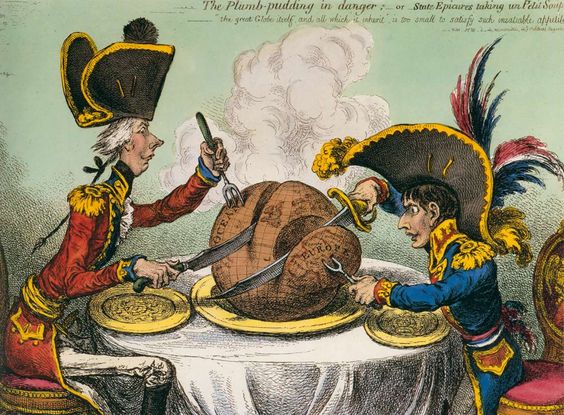The campaign is already gearing up for the UK’s In/Out European Union Referendum sometime this year 2017, even though the exact date is yet to be decided. When everyone else is settling down into trade blocs and multilateral organisations, the UK appears to want to go it alone.
Are they mad? There are tonnes of reasons for staying put, that range from the geo-political to the historical and geographical.
Psycho-Geography
The first thing to notice about the UK is its psycho-geography. It’s an archipelago of islands off the European coast. Usually, offshore islands are very different to their continental neighbours. Think Cuba and the US, Taiwan and China or Japan and the rest of east Asia. The people of Madagascar aren’t Africans by decent, culture or language but descended from Malayan migrants.
I would include Britain in the trend because its history in the last 500 or so years has lent itself to isolation, even if it has been involved from time to time in European power politics. The big factor here is the Empire and the relationship with the sea. Other colonial powers had land borders with their European neighbours, especially France, Holland and Spain. England (later, Britain) had…well nobody.
That has continued right up to the modern myth of the And that’s the point, the British are still obsessed with Empire, even though it has been long dead.
Join ing the Common Market (as it was called in the early 1970s) has been Britain’s biggest European adventure since England abolished the monasteries and overthrew the Catholic Church in 1535.
ing the Common Market (as it was called in the early 1970s) has been Britain’s biggest European adventure since England abolished the monasteries and overthrew the Catholic Church in 1535.
The Bear in the Room
So why stay? Where do I start? Geo-politics. The elephant in the room isn’t an elephant at all, it’s a bear. Russia is trying to exert as much pressure on the EU as possible with its war in the Ukraine and military campaign in Syria. The EU has sanctions against Russia in response to its invasion of Ukraine. That was prompted by the overhrow of the client president Viktor Yanukovich. He was toppled by demonstrations sparked by his junking of an economic agreement with the EU, choosing a package of loans from Russia instead.
Russia quietly invading Ukraine caught the West napping. The intervention in Syria has had a similar surprise factor alongside with the hundreds of thousands of people fleeing the war zone to get to the safety of Europe. That poses an even greater problem because the vast numbers of people seeking shelter are pushing European cohesion to breaking point. Much more of this and the free movement of people, a corner stone of the Union, could end. Russia wants those sanctions ended and wants the reduction of a regional rival.
Could plucky Britain really stand up to that kind of thing, alone, without the help or co-operation of allies across the English Channel

Britain’s oldest ally, since 1386
The Cold of the Global Village
Then there are the vagaries of globalization. I doubt China, the US or the EU intend to give much ground to each other when they negotiate trade deals, which is the way of the world. China has set up its Shanghai Co-Operation Organisation, sometimes referred to as ‘the dictators’ club’, drawing in the former Soviet Republics of central Asia. While Russia is a member, it is also trying to set up its own Eurasian Economic Community.
Other states are not jumping out of economic co-operation blocs, but are building more. This has happened in North America with NAFTA, South America’s Mercusur, with even African states getting in on the idea with the African Union.
It is a long time since the UK was a serious power in the world, able to act alone with a free hand. Belonging to the EU shores up Britain’s reputation and prestige. States as powerful as China and the US see political / economic bloc making as underpinning both the economy and their political stature. Membership of the EU guarantees a place at the top table, not least because of the sheer size of the market it belongs and exports to.
Being Norway, or Not
Opponents of UK membership of the EU suggest Britain can survive outside of the Union, in a manner similar to Switzerland and Norway, both successful countries who are pointedly not members. The difficulty here is that Norway and Switzerland are powerless to change anything because they are members of the European Economic Area, not full members of the EU. Therefore things just happen, they have to conform to everything the Union requires in areas such as student exchanges, food regulations and exporting goods into the EU. And these still cost money.
In each area of our lives, being part of the EU has given the British the kinds of standards a civilized society should aspire to. Be it not being killed at work, having food that doesn’t poison us and having beaches and waters that are clean and safe to enjoy. All of this risks being swept away if the UK jumps ship, not least because of its unwillingness to stand up to corporate power within and without its borders.

Even these two have been allies since 1904
The Invasions
Other reasons for remaining in the EU are cultural, historical and geographical. Whether anyone likes it or not, the UK is physically a part of Europe. That isn’t going to change any time soon. Our history has been bound up with Europe since people first arrived on what was to become these islands. Invasions by the ‘Celts’, the Romans, Saxons, Vikings, Normans still have a massive and lasting effect on our landscape, language and culture. Much of our involvement was a jostling rivalry with mainland European powers, often it was co-operation under hard circumstances. This co-operation has only deepened with the EU because it has made war unthinkable within its borders.

The original swashbuckler. Anthony Van Dyke, Flemish, court painter to Charles I and driving force in English / British Baroque art; self portrait 1623
Culturally, the British have changed markedly since they began holidaying in Europe. We now have a café culture and a love of good food & wine, we even like to hug each other and sometimes greet each other with a kiss, ok mostly the women. All because of the ability to travel cheaply and freely in Europe. This is a stark contrast to the kind of country my parents grew up in in the 1950s & 60s where restaurants served the same bland, boring food; cafes were mostly of the ‘greasy spoon’ variety (nothing wrong with them, just nice to have variety) and people were stiffly formal in public.
Our art, music and philosophy have been greatly influenced by European artists bringing their skills to Britain, from where we have become hugely influential in our own right.
Joining the EU has been enormously beneficial to the UK, giving it a post-imperial role like nothing else. It has enriched our national life in so many ways. Leaving would be foolish.

Where do you think Monet got it from? JMW Turner, British; Tours, Sunset
















